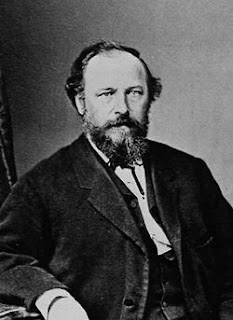 | ||
| Brigadier General Ormsby M. Mitchel |
He was also an important figure in the Civil War, especially in the Cincinnati and Northern Kentucky area, helping start the building of the local defenses on the hills south of the Ohio River in 1861. The biggest local fort, Fort Mitchel, was named in his honor and eventually this area became the town of Fort Mitchell, which still exists today, though nobody knows when the second "l" was added to the town name. (Even the story I transcribe today spelled it as "Mitchell" and I will leave it as is, though "Mitchel" is correct. Apparently the second "l" just makes it look better or more natural to anybody writing his name.)
He was also general who gave permission for the raid that became known as the "The Great Locomotive Chase," familiar to many through a 1950's Disney Movie
I have not been able to find what the specific charges were against Mitchel, but the story makes it seem it involved the behavior of the men under his command.
The Charge Against Gen. Mitchel
The Cincinnati Times gives the following as the foundation of the Louisville Journal's charge against Gen. Mitchell:
"One of Gen. Mitchell's brigades is commanded by Col. Turchin, of Illinois. Turchin is an old European soldier, a Prussian by birth, an accomplished soldier but loose in his morals. His own regiment, the 19th Illinois, forms part of his brigade."
"Since it has been in the service, the 19th Illinois has continually disgraced itself by committing depredations on citizens and especially upon Secessionists. At Bowling Green, their conduct was so outrageous, that Gen. Mitchell was compelled to interfere, and did so effectively. The regiment behaved themselves thereafter. After Gen. Mitchell's arrival in Alabama, he dispatched Turchin, with his brigade, to Athens. The troops were constantly subjected to assassination by the citizens of that town. Almost every hour, soldiers were murdered in cold blood, by assassins who could not be discovered. Turchin became enraged, and one day let his men loose upon the town. As the story goes, he agreed to 'shut his eyes' for two hours.
"The revenge of the men was fearful, no one being spared in the excesses which followed, and there is no doubt that crimes of a very grave character were perpetrated by the soldiery, especially by the 19th Illinois. At the end of the two hours, Turchin 'opened his eyes' and the excesses ceased."
--
Colonel Turchin was court-martialed for his actions. Here is a period article about the trial. Note that Colonel Marcellus Mundy, mentioned in my previous entry, was among the members of the court, along with future president James A. Garfield.
According to this additional link, the court convicted Turchin and cashiered him from the service, but the fortunate office received a break thanks to the kindness of President Lincoln. He remained in the service and even was promoted to Brigadier General. He resigned his position in late 1864 when poor health led him to resign.
 |
| Col. John B Turchin, courtesy wikipedia |
No comments:
Post a Comment